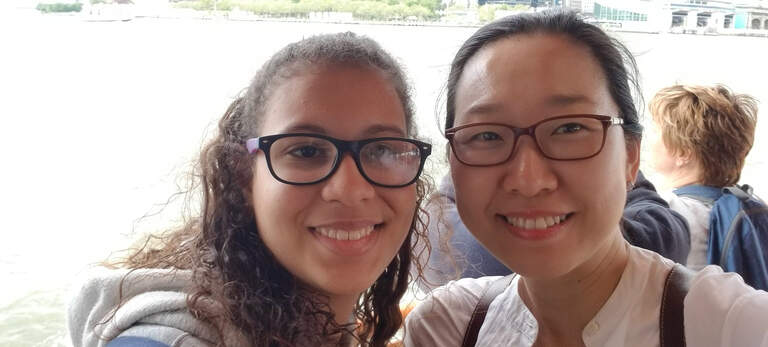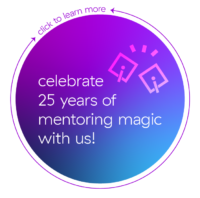When Haemi Lim first became a mentor, she focused entirely on supporting her mentee Yesly in becoming ready for college. The pair quickly bonded over both being women of ethnic minority backgrounds in New York City—Yesly a Dominican-American, and Haemi an Australian of Asian descent—but beyond that, Haemi didn’t spend much time thinking about their racial histories, or how her own experiences of race and privilege might be affecting their relationship.
That was until she began participating in iMentor’s Mentor Education Program, launched in February 2020 as an outgrowth of the organization’s commitment to diversity, equity and inclusion. As part of the program, mentors participate in a series of online, self-directed Monthly Learning Moments (MLMs) designed to spark reflection about how issues of identity and race play out in our day-to-day lives. Participants also come together—both in-person and online—to discuss that month’s learning.
“The learning moments have been a real gift to me,” said Haemi, who presented about her experience in the program at a conference of the National College Attainment Network in October. “It’s absolutely made me a better mentor, a better leader, more empathetic—just a better person.”
Haemi, a mentor from Barclays, said her entire mindset has shifted through the program’s emphasis on narrative and framing, which has encouraged her to think of Yesly in terms of strengths, rather than deficits.
“For instance, Yesly is an English learner, and when we were matched, a big goal was to improve her English,” Haemi said. “Participating in this Mentor Education Program has helped me reframe the conversation as ‘Wow, you’re bilingual! You speak two languages!’ It’s framing things around her strengths, and not around what she might be perceived as lacking.”
Why is this so important? Haemi explains: “If we want to address the inequalities in our society in a meaningful way, we have to address the person’s dreams and aspirations. If I engage the person as the problem, I become the problem. We need a strengths-based approach.”
For many mentors, one of the biggest rewards of being part of iMentor is their own growth and engagement, and in particular, developing a greater awareness of the challenges around equity in education. Through the MLMs, mentors also have a chance to explore their own connections with the social structures that impact the day-to-day lives of our students. And although the largest goal of the Mentor Education Program is to strengthen volunteers’ abilities to serve iMentor’s students, the program is intended to benefit mentors in their larger lives as well.
Some 98 percent of iMentor students identify as people of color, compared to 43 percent of mentors. To ensure students have the support they need, iMentor highly prioritizes recruiting mentors that share the student’s experience, and helping mentors understand the perspective and experiences of the students they’re serving.
Even for mentors who are people of color, like Haemi, this time to reflect and learn can be invaluable.
“As an Asian woman and a young girl of Hispanic background, Yesly and I have very different experiences,” Haemi said. “There are different biases that apply to each of us. It’s not so straightforward. We like to put people in boxes and categories, but these things do not exist in a monolith. That’s the beauty of these discussions we have in our MLMs. It’s all about the nuance. It’s all about the grey areas.” (Read more about Haemi and Yesly in "In Mentoring, Haemi Makes It Count".)
To develop the Mentor Education Program, iMentor partnered with the Perception Institute, a consortium of researchers, advocates and strategists who create solutions from cutting-edge mind science research to reduce discrimination and other harms linked to race, gender, and other identity differences.
In February 2021, iMentor partnered with Bloomberg LP to expand the Mentor Education Program into a three-year national initiative. Through the partnership, iMentor will continue to strengthen engagement with its mentors and build an even more impactful community of volunteers who will leverage their networks and influence around issues of systemic racism and educational equity.
More than 6,000 volunteer mentors in the iMentor program currently work with young people in New York, Baltimore, the Bay Area, and Chicago, each committing a minimum of three years to a single student.
Read more stories about iMentor students and mentors. Think you've got what it takes to mentor a young person? Check out our Mentoring Toolbox resources and learn how to become a volunteer mentor.

